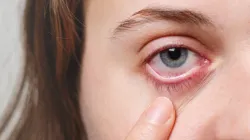Common eye diseases worsened by pollution and how to prevent them
The impact of pollution is blinding, but with precautions and modern technology, we can reduce its impact. From improving air filters and getting regular eye exams, there are many ways to protect your eyes from the damage that pollution can do.

In big cities like Delhi, where air pollution is extremely high, pollution is no longer a problem for the lungs. It also affects eye health. Air pollution can cause a variety of eye problems, from irritation and dryness to more serious conditions like glaucoma and cataracts. Let’s take a look at some of the eye diseases that are made worse by pollution, and real-world ways to prevent them (with modern technology).
Dry Eye Syndrome
When we spoke to Dr Ajay Sharma, Founder and CMD Eye-Q, regarding common eye diseases, he said that dry eyes occur when the eye does not produce enough moisture or when the tear film evaporates too quickly. Air pollution such as dust, smoke, and chemicals can cause eye irritation, dry eyes, and dry eyes. This can cause redness, a gritty feeling, and blurred vision. This device reduces exposure to general pollution by filtering harmful particles from indoor air. A humidifier can also help maintain moisture in the air to prevent dry eyes. Artificial tear drops are another solution that moisturizes the eyes and reduces pain. Try to stay indoors or limit outdoor activities, especially on polluted days.
Allergic Conjunctivitis
Allergic conjunctivitis is a condition in which the eyes become inflamed due to airborne allergens such as pollen, dust, and smoke. Air pollution can cause or worsen allergic reactions, causing red, itchy, and watery eyes. These devices help create a cleaner environment for your eyes by capturing airborne allergens such as pollen, dust, and even pet dander. If you are in high-pollution air, wearing protective eyewear such as sunglasses or goggles can help keep dust and other pollutants from getting into your eyes. Prevent dust and other particles from getting into your eyes.
Corneal Damage
The cornea is the clear layer of the eye and is very sensitive to environmental factors. Exposure to pollutants such as chemicals, cigarettes, and small objects can damage the bone, causing pain and even scarring over time. This can damage vision and lead to long-term eye problems. These glasses also protect your eyes from harmful ultraviolet rays that can damage your eyes. Using artificial tears can also keep the surface of your eye dry and prevent bacteria from sticking to your eyes. A clean environment and good ventilation, whether at home or in the office, are important to protect the bones from contamination.
Technological Solutions for Pollution Protection
There are a few things you can do today to help prevent pollution from damaging your eyes. Smart air purifiers are essential for filtering pollutants in your home and office. These devices usually have high-quality filters, such as HEPA filters, that can catch even the smallest particles. Take steps to protect your eyes. These sensors can alert you when pollution levels are high, helping you stay home or use protection, such as wearing a mask.